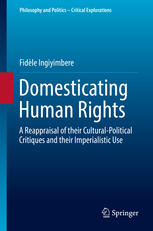

Most ebook files are in PDF format, so you can easily read them using various software such as Foxit Reader or directly on the Google Chrome browser.
Some ebook files are released by publishers in other formats such as .awz, .mobi, .epub, .fb2, etc. You may need to install specific software to read these formats on mobile/PC, such as Calibre.
Please read the tutorial at this link: https://ebookbell.com/faq
We offer FREE conversion to the popular formats you request; however, this may take some time. Therefore, right after payment, please email us, and we will try to provide the service as quickly as possible.
For some exceptional file formats or broken links (if any), please refrain from opening any disputes. Instead, email us first, and we will try to assist within a maximum of 6 hours.
EbookBell Team

0.0
0 reviewsThis book develops a philosophical conception of human rights that responds satisfactorily to the challenges raised by cultural and political critics of human rights, who contend that the contemporary human rights movement is promoting an imperialist ideology, and that the humanitarian intervention for protecting human rights is a neo-colonialism. These claims affect the normativity and effectiveness of human rights; that is why they have to be taken seriously. At the same time, the same philosophical account dismisses the imperialist crusaders who support the imperialistic use of human rights by the West to advance liberal culture.
Thus, after elaborating and exposing these criticisms, the book confronts them to the human rights theories of John Rawls and Jürgen Habermas, in order to see whether they can be addressed. Unfortunately, they are not. Therefore, having shown that these two philosophical accounts of human rights do not respond convincingly to those the postcolonial challenges, the book provides an alternative conception that draws the understanding of human rights from local practices. It is a multilayer conception which is not centered on state, but rather integrates it in a larger web of actors involved in shaping the practice and meaning of human rights. Confronted to the challenges, this new conception offers a promising way for addressing them satisfactorily, and it even sheds new light to the classical questions of universality of human rights, as well as the tension between universalism and relativism.